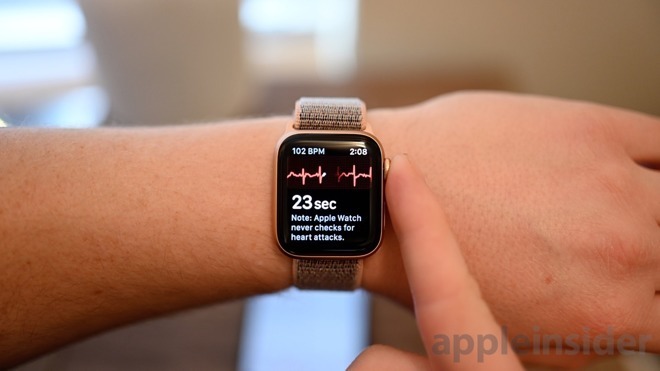Apple in talks to put Apple Watch into the hands of Medicare users
Apple has reportedly spoken with "at least three" private Medicare plan providers, exploring the possibility of subsidizing the Apple Watch for seniors 65 or older.

No deals have been signed, but Apple has visited "several of the largest insurers in the market, as well as some smaller, venture-backed Medicare Advantage plans," CNBC said on Wednesday, citing multiple sources. The idea would be to reduce the cost of a Watch for people who can't justify the minimum $279 pricetag for last year's Series 3. The Series 4 starts at $399.
Both models can monitor heart rate and detect signs of atrial fibrillation. The Series 4 has additional health features, namely built-in ECG support and fall detection.
While the Watch is more expensive than other fitness trackers, insurance executives told CNBC that they're willing to work with Apple if it can show that the product can prevent costly medical treatments.
"Avoiding one emergency room visit would more than pay for the device," commented Bright Health CEO Bob Sheehy.
Apple has already made pacts with U.S. insurers outside of Medicare, for instance signing a 2016 deal with Aetna giving Watch discounts to the latter's workers and customers. Life insurer John Hancock began offering the Watch to memebers of its Vitality program in 2017, and in November 2018 UnitedHealthcare started offering the Watch for free to people who meet daily fitness goals for six months.

No deals have been signed, but Apple has visited "several of the largest insurers in the market, as well as some smaller, venture-backed Medicare Advantage plans," CNBC said on Wednesday, citing multiple sources. The idea would be to reduce the cost of a Watch for people who can't justify the minimum $279 pricetag for last year's Series 3. The Series 4 starts at $399.
Both models can monitor heart rate and detect signs of atrial fibrillation. The Series 4 has additional health features, namely built-in ECG support and fall detection.
While the Watch is more expensive than other fitness trackers, insurance executives told CNBC that they're willing to work with Apple if it can show that the product can prevent costly medical treatments.
"Avoiding one emergency room visit would more than pay for the device," commented Bright Health CEO Bob Sheehy.
Apple has already made pacts with U.S. insurers outside of Medicare, for instance signing a 2016 deal with Aetna giving Watch discounts to the latter's workers and customers. Life insurer John Hancock began offering the Watch to memebers of its Vitality program in 2017, and in November 2018 UnitedHealthcare started offering the Watch for free to people who meet daily fitness goals for six months.

Comments
1) Bypassing the healthcare system (of which insurers are a part) leaves them off the hook. Basically, the health care system says: "We will manage your diseases, but promoting your health is strictly YOUR responsibility." The net effect is: We pay our healthcare system $3.5 Trillion a year (5 times the defense budget).. And 75% of that goes to treat the cumulative effects of unhealthy lifestyles. That is: our healthcare system has a nice racket going: They refuse to give anymore than lip service to disease prevention* and make hundreds of billions treating the effects of the diseases caused by those unhealthy lifestyles.
(* Our healthcare system calls early detection (like PSA tests) "Prevention". They aren't. They are simply early detection enabling earlier treatment. True prevention can only be done with a healthy lifestyle.)
2) Collecting all of your medical history from healthcare providers and spreading it around carries the assumption that that information is accurate. Seldom is that true. More likely it contains a raft of diagnosis that were made to diagnose a condition or to justify and insurance payment -- or simply because the physician was wrong.
Yes, providing seniors with arrhythmia detection, fall detection and a simple, always available way to call for help would be a VERY good thing. I agree with doing that, 200% (particularly the latter two).
But, the biggest benefit from the Apple Watch (and its companion the iPhone) lies in the years leading up to Medicare eligibility. That is: Most of our "age related" chronic diseases such as debility, heart disease, cancer, diabetes, arthritis, etc... are not caused by aging but by the cumulative effects of decades of unhealthy lifestyles.
Heart Disease, like cancer and other chronic diseases, start decades before it becomes symptomatic and slowly build until they become detectable by the medical profession and then, suddenly, they become a disease to be treated (when its often too late).
Insurers would be better served by providing Apple Watches to 20 somethings so they could promote healthy lifestyles that would avoid an estimated 50-80% of our so called "age related" chronic diseases that pop up 40-50 years later.
What is sad is the (again brutal) reality that as we age, comprehending change and nuanced detail becomes more difficult. Senses fail, and motor function becomes impaired. When my 80+ father was in his last days, I got him an iPad to use from his hospital bed. Telephone was unusable (for years) with him, because he simply could not hear. Getting a working hearing assist device was simply an exercise in continuous frustration. However, the mere holding of an iPad, much less seeing and using a touchscreen was simply impossible.
And too, many of those "age related diseases" are, again,, the results of decades of unhealthy lifestyles -- that includes much of vision loss (hearing probably less so) and arthritis. That's a problem and we need to fix it
My problem with the Apple Watch is that I need to use my reading glasses to see the small text. I can't do that while driving because the reading glasses only focus for a close distance - not suitable while driving or even walking around for that matter. I'm thinking of getting RK but I've read it doesn't remain effective past a few years.